Major Appliances

Introduction
In our modern world, major appliances are the cornerstone of household efficiency, industrial productivity, and personal comfort. They represent a fusion of technology and utility, enhancing the quality of life by performing tasks that would otherwise be time-consuming or physically demanding. This comprehensive article will delve into the intricacies of major appliances, their global impact, economic significance, technological evolution, policy frameworks, challenges, and future prospects. By the end of this exploration, readers will have a nuanced understanding of how these ubiquitous devices shape our daily lives, economies, and environments.
Understanding Major-Appliances
Major appliances are machines used in homes, commercial establishments, and industries for performing domestic or technical functions. They range from refrigerators and washing machines to industrial-scale machinery like centrifugal pumps and air conditioners. These appliances are integral to modern living, offering convenience, efficiency, and hygiene. Their core components include motors, compressors, heating elements, sensors, and control systems, all of which work in harmony to deliver their respective functions.
Historically, the development of major appliances has been a testament to human ingenuity and the pursuit of progress. From the invention of the mechanical refrigerator in the early 20th century to the smart, energy-efficient appliances of today, each advancement has significantly impacted society. These appliances are a critical component of the broader landscape of technological innovation, reflecting societal needs, environmental concerns, and economic shifts.
Global Impact and Trends
The global impact of major appliances is profound. They are a significant driver of economic growth, influencing industries ranging from manufacturing to services. Trends such as the rise of smart homes, energy-efficient technology, and the increasing demand for sustainable living solutions are shaping the trajectory of this sector. In developed nations like the United States and Europe, the focus is on energy conservation and integration with renewable energy sources. In emerging economies, the challenge lies in meeting the growing demand for appliances while ensuring accessibility and affordability.
Economic Considerations
The economic landscape of major appliances is multifaceted. It encompasses market dynamics influenced by consumer preferences, technological advancements, and global economic conditions. Investment patterns in this sector are driven by the potential for innovation, cost reduction, and sustainable practices. Major-appliances play a pivotal role in economic systems, contributing to job creation, industrial growth, and innovation. They also represent a substantial market segment with significant investment opportunities.
Technological Advancements
Technological advancements have revolutionized the major-appliance industry. Innovations such as the Internet of Things (IoT) have led to the development of smart appliances capable of self-diagnosis, energy management, and even remote operation. These advancements not only enhance user experience but also contribute to energy savings and environmental sustainability. The future potential of major-appliances lies in their integration with artificial intelligence (AI), machine learning, and advanced materials that could lead to more efficient, durable, and eco-friendly products.
Policy and Regulation
Policies and regulations play a crucial role in governing the development and use of major appliances. International bodies like the United Nations and regional organizations such as the European Union have established standards and guidelines to ensure safety, energy efficiency, and environmental protection. These frameworks not only dictate design and performance criteria but also influence consumer behavior and market competition. Compliance with these regulations is essential for manufacturers looking to operate within international markets.
Challenges and Criticisms
Major-appliances face several challenges, including energy consumption, electronic waste, and the integration of sustainable materials. Critics argue that while appliances have brought convenience, they also contribute to a culture of excess and environmental degradation. Addressing these issues requires a multifaceted approach, including the development of more energy-efficient designs, recycling programs, and consumer education on sustainable practices.
Case Studies
Several case studies illustrate the successful application of major appliances. For instance, LG’s development of Direct Drive technology in washing machines has set a new standard for efficiency and durability. Samsung’s Family Hub refrigerator showcases how IoT can enhance kitchen management and family connectivity. These examples serve as valuable lessons in innovation, market responsiveness, and consumer engagement.
Future Prospects
The future prospects of major appliances are promising. Growth areas include smart home integration, energy storage solutions, and the development of appliances tailored to the needs of different demographic groups. Emerging trends suggest a move towards more sustainable and modular designs that can adapt to changing lifestyles and technological advancements. Strategic considerations for manufacturers will revolve around innovation, sustainability, and responsiveness to consumer demands.
Conclusion
In conclusion, major appliances are indispensable in our modern world, influencing economic systems, shaping societal norms, and contributing to environmental challenges. Their historical significance, current impact, and future potential underscore their importance in the landscape of technology and daily life. As we move forward, it is imperative that we continue to innovate, regulate, and address the challenges associated with these ubiquitous devices to ensure they remain a positive force for society.
FAQ Section
-
What are major appliances? Major appliances are machines used in households and commercial establishments for tasks such as cooking, cleaning, refrigeration, and laundry. They include items like refrigerators, washing machines, ovens, and air conditioners.
-
Why are smart appliances gaining popularity? Smart appliances are gaining popularity due to their convenience, energy efficiency, and the ability to connect with other devices within a smart home ecosystem.
-
What are some of the environmental challenges associated with major appliances? Environmental challenges include high energy consumption, electronic waste from discarded appliances, and the use of non-sustainable materials in manufacturing.
-
How do regulations impact the major-appliance industry? Regulations set performance standards, safety requirements, and environmental benchmarks that manufacturers must adhere to. These guide the innovation process and influence market competition by favoring products that meet these criteria.
-
What trends are shaping the future of major appliances? Key trends include integration with renewable energy sources, development of sustainable materials, IoT connectivity, and appliances that cater to diverse consumer needs and preferences.
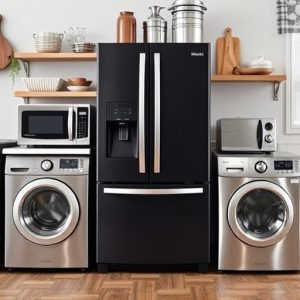
Refrigerator Coolant Leak Detection: Safeguarding Food Quality in Major Appliances
Refrigerator coolant leaks pose significant risks to both food safety and property damage, causing s.......

Silence Loud Spin Noises: Easy Drum Bearing Replacement Guide for Major Appliances
Drum bearings in major appliances like washing machines are critical for smooth operations; they wea.......

Shock Absorbers: Silent Partners in Major Appliances’ Comfort
Washing machines produce vibration noise due to drum rotation and water/cloth movement. Shock absorb.......

Preventing Food Spoilage: Early Refrigerator Coolant Leak Detection in Major Appliances
Refrigerator coolant leaks in major appliances pose risks to energy efficiency and food safety. Caus.......
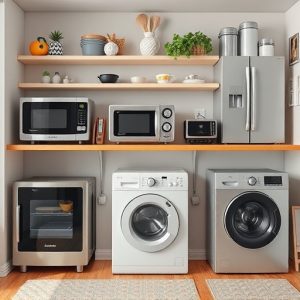
Extend Water Heater Lifespan: Easy Anode Rod Replacement Guide
This text discusses the significance of selecting energy-efficient major appliances, focusing on the.......

Efficient Air Conditioner Compressor Repairs for Major Appliances in Summer Heat
Efficient major appliances like AC units rely on well-maintained air conditioner compressors. Regula.......
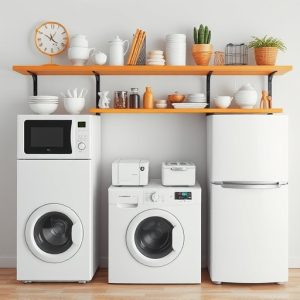
Restore Optimal Baking with Major Appliance Oven Heating Element Replacements
Oven heating elements are essential for precise temperature control in baking and roasting, ensuring.......

Shock Absorbers in Washing Machines: Reducing Noise in Major Appliances
Washing machines, especially high-capacity models, can produce unwanted vibration noises due to comp.......
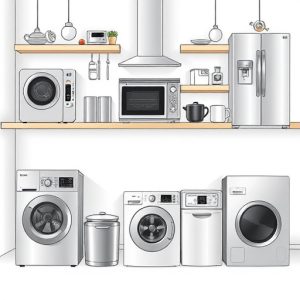
Detect Refrigerator Leaks to Prevent Food Spoilage in Major Appliances
Refrigerator coolant leaks, often due to worn gaskets or damage, pose significant risks to homeowner.......
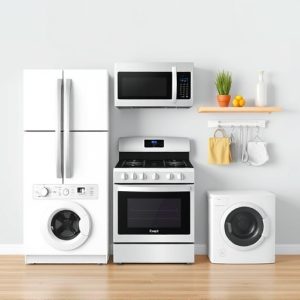
Optimizing Dryer Performance: Calibrating Thermostats in Major Appliances
Maintaining accurate temperature control in major appliances like dryers is crucial for efficiency a.......